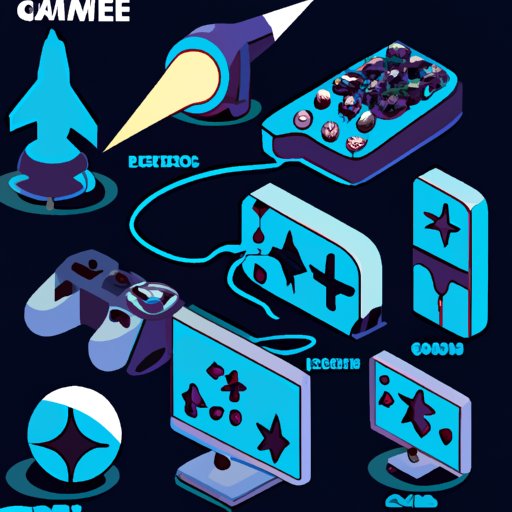
Introduction
Have you ever wanted to create your own video game but didn’t know where to start? Fear not, as this article aims to provide a step-by-step guide to help beginners in game development overcome the common challenges they face. We’ll break down the game development process to provide a better understanding of the process.
Step-by-Step Guide
The game development process involves several stages, including concept ideation, prototyping, designing, developing, testing, and publishing. Before starting any game development project, it’s essential to define the game development process.
The ideation process starts with conceptualization, where the central game idea is formed. Then, character creation, storyboarding, and worldbuilding follow. The game’s mechanics and game design document, including asset generation and project management tools, are essential in the initial stages.
Choose the Right Game Engine
The game engine is the core of the game development process and serves as the framework for the game’s design, programming, and execution. There are many popular engines available, including Unity 3D, Unreal Engine, GameMaker Studio, Ren’Py, and Godot Engine.
When selecting a game engine, factors such as game genre, the complexity of the game, scalability, development budget, and documentation should be considered. After choosing a game engine, gamedev’s first step should be mastering the engine and development platform.
Game Asset Design Tutorials
Game asset design is the process of creating visual and audio elements for a game. From characters and objects to environmental elements, it’s essential to create game assets that are visually appealing, informative, and consistent with the game’s overall aesthetic and style. Popular software tools for game asset design include Adobe Photoshop, Blender, Maya, ZBrush, and Sketch.
Some tips for designing game assets include paying attention to detail, creating simple and reusable designs, utilizing references and tutorials, and working within the game’s engine capabilities to avoid asset conflicts.
Tips and Tricks for Programming in Game Development
Programming is the engine that powers games, and without the right knowledge, even the best game ideas will not work. To succeed in programming for games, understanding the game engine language, documentation, and breaking code down into smaller, manageable tasks is essential.
It’s also crucial to write clean and efficient code to avoid glitches and other issues that can negatively affect the game’s playability. Advanced programming concepts like code optimization, automation, and bug testing are also important for producing high-quality games.
Interview with a Game Developer
Getting insights from experienced game developers is a great way to get an idea of the challenges and best practices related to creating games. In this section, we’ll interview a seasoned game developer and discuss their experiences with the game development process, lessons learned, and trends in the industry.
Case Studies
Studying the creation process of successful games can help aspiring game developers understand the challenges faced and overcome them. In this section, we’ll analyze popular games like Minecraft, Among Us, and PUBG. We’ll delve into the game concept, design, and development process and list out the creative obstacles that the game developers overcame in turning each game into a successful product.
Publish and Market Tips
Once the game is finalized and ready to be published, it’s essential to invest in marketing and advertising efforts to ensure that the game reaches its target audience. The promotion process includes finding publishers, distributing the game, creating trailers, and leveraging social media. After promoting the game, it’s crucial to gauge consumer feedback and make updates to the game as needed.
Conclusion
The game development process is a challenging but rewarding endeavor. With the right tools, knowledge, and motivation, anyone can create excellent games! Use the steps outlined in this article to get started or to overcome common issues you may encounter.





